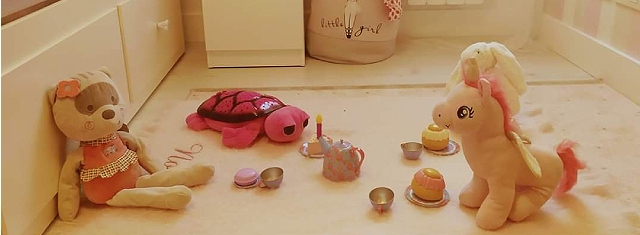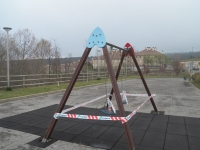Health
When the Ratoncito Perez mocked the Coronavirus
Children in the pandemic

Virginia's home games (Source: Virginia Casares)
USPA NEWS -
Carmen is 6 years old and these days she has lost her first tooth. Others are about to fall. The girl is very concerned that the Ratoncito Pérez cannot get to her house due to the movement restrictions imposed by the Spanish Government due to the Coronavirus. The Ratón Pérez is a fantastic character who collects the teeth that fall out of the children and exchanges them for sweets and gifts. It first appeared in 1894, when the Jesuit priest Luis Coloma introduced the character in a story he wrote, commissioned by the Crown, for the future King of Spain, Alfonso XIII.
Carmen's concern reached the Civil Guard, who reassured the girl on social networks: “Don't worry, Carmen! The Ratoncito Pérez is working alone and he is also going to take your gift, so if a civil guard sees him he will help the Ratoncito Pérez find your home. You will surely love your gift!“
What makes Carmen sleepless is the same thing that worries the Spaniards, who are still confined to their homes because of the Coronavirus. This Saturday marks the fifteenth day of confinement for all those citizens who are not health, military, police, transport, journalists or employees of supermarkets, pharmacies or tobacconists. The rest remain in their homes, trusting that their obligatory confinement will serve to cut the transmission pathways of the Covid-19. Confinement is hard for everyone, but especially it is for children.
According to the WHO, children can be both transmitters and victims of the Coronavirus. The health authorities insist on the need to protect them and stress the convenience that they do not relate to their grandparents, since the elderly are the group with the highest risk of contagion and death in Spain. But how to keep children locked up at home for a month - the confinement will be extend another fifteen days, until April 11? It is another big problem that families face.
When the Spanish Government declared a state of alarm on March 13 and decreed the closure of all schools, institutes and universities in the country, the educational authorities developed a plan for students of all levels to learn from home through exercises and work. ordered by their teachers. Distance learning became widespread, in order to protect younger generations from contagion. Parents automatically became home teachers, and many had to dust off their knowledge to help their children.
But the problem grows with younger children. Pediatricians warn of the importance of outdoor play for the correct development of children and psychologists emphasize the importance of play in learning. Of the symbolic game, in which the imagination plays a fundamental role. This is all the more important the younger the children are. At an early age, the little ones do not understand what is happening in Spain and only know that they cannot go outside, go to the park or play with their friends. The hours become eternal.
Walking through any Spanish city these days is doing it through deserted streets and closed parks. Although the government corrected after a week of confinement and now allows children to go outside, accompanied by their parents, for short walks, they cannot play with other children or have fun on the swings and slides that exists in the street parks. Most of the time they are at home.
Virginia Casares is a speech therapist in La Coruña (Galicia, north-western Spain) and has two children, six and four years old. Every day, Virginia organizes games and performances to entertain her two little ones. "But they don't listen to me," she laments in conversation with USPA News. At their age, they overflow with energy. The private garden that surrounds their home makes things easier: they can run and play outside. Still, they spend many hours inside the house, and of these, most are hours spent playing. At the home of this Galician speech therapist, they take care that children do not abuse television.
Traditionally, for some decades, the children of many Spanish families spend hours in front of television and with video games. But the Coronavirus pandemic is unlocking the creativity of many parents. Cooking, drawing, modeling or theater workshops are improvised in the halls of many Spanish homes for children to learn and have fun. And so they don't think about why they have to stay locked up. According to psychologists, at an early age children are unable to understand what is happening.
The pandemic has overwhelmed governments around the world, also Spanish. Governments that have not taken measures for children, beyond isolating them at home and promoting distance learning. The declared objective is that Spanish students do not miss the course, although the end of it may be delayed and the exams have to adapt to the new situation created by the Coronavirus.
Liability for this article lies with the author, who also holds the copyright. Editorial content from USPA may be quoted on other websites as long as the quote comprises no more than 5% of the entire text, is marked as such and the source is named (via hyperlink).







